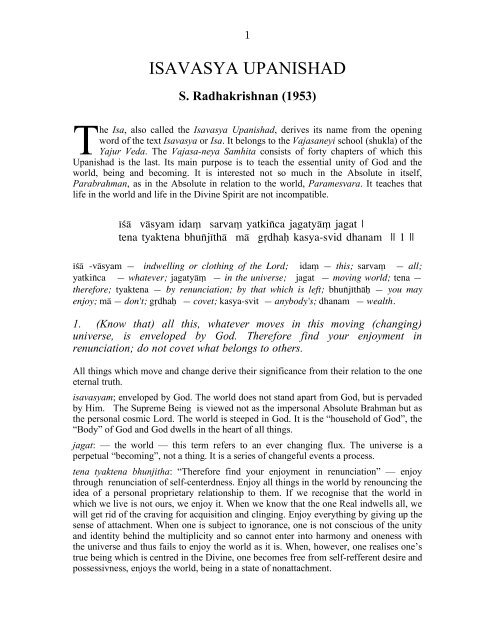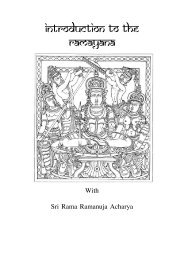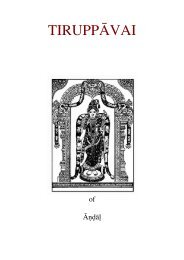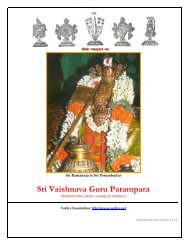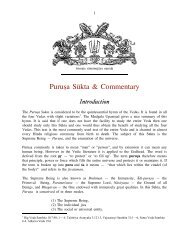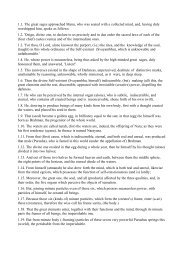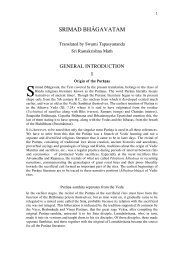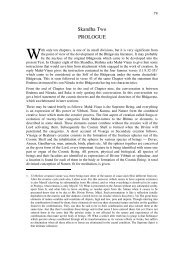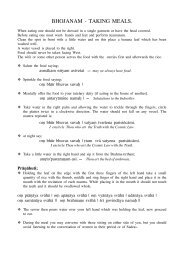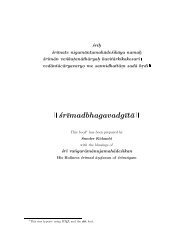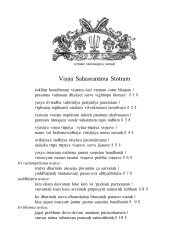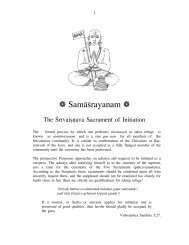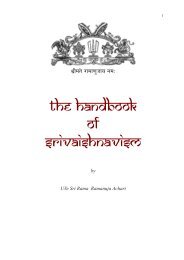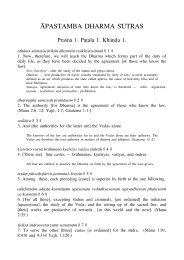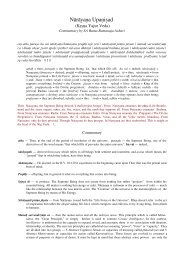Isa Upanisad - Yajur Veda Australasia - Resources
Isa Upanisad - Yajur Veda Australasia - Resources
Isa Upanisad - Yajur Veda Australasia - Resources
Create successful ePaper yourself
Turn your PDF publications into a flip-book with our unique Google optimized e-Paper software.
4asuryå¿ — sunless, demonic; nåma — really; te — those; lokå¿ — people,worlds; andhena — by blinding ; tamas — darkness; åv®tå¿ — covered; tån — tothose; te — they; pretya — after death; abhigacchanti — go to; ye ke ca —whoseoever; atma-hano — spiritual suicides; janå¿ — people.3. Demoniac, verily, are those worlds enveloped in blinding darkness, andto them go after death, those people who are the slayers of the Self.asurya: (sunless) appertaining to the asuras, those who delight only in materialism orphtysical being (asu), those who are devoted to self-cherishing, and addicted to sensualpleasures.For Sankara asuras are those who are ignorant of the Self. The term includes all persons,from humans to the highest gods, who have not achieved the knowledge of the SupremeSelf.andhena tamasa; ignorance which consists in the inability to see one's self.atmahano janah: Those who neglect the Self. Such people are destined for the joyless,demoniac regions, enveloped in darkness. See B.U. IV. 4. 11.anejad ekaµ manaso javîyo nainad devå åpnuvan pûrvam arßat |tad dhåvato 'nyånatyeti ti߆hat tasminn apo måtariçvå dadhåti || 4 ||anejat — unmoving; ekaµ — one; manasa¿ — than the mind; javîya¿ —swifter; na — not; enat — this; devå¿ — gods; åpnuvan — reached; pûrvam —before; arßat — ran; tat — it; dhåvata¿ — running; anyån — others; atyeti —overtakes; ti߆hat — staying; tasmin — in it; apa¿ — waters; måtariçvå — thewinds; dadhåti — keeps.THE SUPREME IS IMMANENT AND TRANSCENDENT4. (The Atman) is unmoving, one, swifter than the mind. The senses do notreach It as It is ever ahead of them. Though Itself standing still It outstripsthose who run. In It the allpervading air supports the activities of beings.The whole world has the supreme Self as its basis. It is that whose activity sustains alllife, on which all causes and effects depend and in which all these inhere, which is calledthe thread which supports all the worlds (through which it runs).Gita 7:7. There is nothing whatsoever higher than Me, O Arjuna. Allthis [cosmos] is strung on Me, as clusters of gems on a thread.The Supreme is one essence but has two natures, an eternal immutability and anunceasing change. It is stillness and movement. Immovable in Itself, all things are movedfrom It. The unity and manifoldness are both aspects of the life divine. Unity is the truthand multiplicity is its manifestation. The former is the truth, vidya, the latter ignorance,avidya. The latter is not false except when it is viewed in itself, cut off from the eternal
5unity. Unity constitutes the base of multiplicity and upholds it but multiplicity does notconstitute and uphold the unity.tad ejati tan naijati tad dûre tadvantike |tad antarasya sarvasya tad u sarvasyåsya båhyata¿ || 5 ||tat — it, that; ejati — moves; tat — it; na — not; ejati — moves; tat —that; dûre — far; tat — it; u — verily; antike — near; tat — it; antara¿ —inside; asya — of this; sarvasya — of all; tat — it; u — verily; sarvasya —of all; asya — of this; båhyata¿ — external.5. It moves and It moves not; It is far and It is near; It is within all this andIt is also outside all this.These apparently contradictory statements are not suggestive of the mental unbalance ofthe writer. He is struggling to describe what he experiences through the limitations ofhuman thought and language. The Supreme is beyond the categories of thought. Thoughtis symbolic and so cannot conceive of the Absolute except through negations; yet theAbsolute is not a void. It is all that is in time and yet is beyond time.It is far because it is not capable of attainment by the ignorant and it is very near to thewise because It is their very Self.<strong>Veda</strong>nta Desika quotes two verses to show the distance and the intimacy of the Supremeto the undevout and the devout respectively. These verses indicate the two sides of theDivine, the one and the many, the unmoving and the moving. They do not deny thereality of either. They see the one in the many. The one is the eternal truth of things; themany its manifestatation. The latter is not a figment of the mind. It becomes so when it isdivorced from the sense of its eternal background.All things and beings are the manifestation of the One Supreme, which is describedthrough paradoxes. It is swifter than the mind, the senses cannot grasp It; It eludes theirhold. Standing, It outstrips all. Rooted in It, all the cosmic forces energise the wholeuniverse. It moves and yet is motionless. It is near, yet distant. It is inside of all andoutside of all.Gita 7:4. Earth, water, fire, air, ether, mind, intellect and the principle ofego; thus My Material Nature [Prakrti] is divided eightfold.5. This is My Inferior Nature [Prakrti]. But, O mighty-armed One, knowthat My Superior Nature is different. It is the life-principle [Jiva-bhuta], bywhich this universe is sustained.6. Know that all beings originate from these two. Therefore, I am the originand the dissolution of the whole universe.
6yas tu sarvå±i bhûtåni åtmani eva anupaçyati |sarva bhûteßu ca åtmånaµ tato na vijugupsate || 6 ||ya¿ — who; tu — however; sarvå±i — all; bhûtåni — beings; åtmani — inthe Self; eva — alone; anupaçyati — constantly sees; sarva — all; bhûteßu — inbeings; ca — and; åtmånaµ — Self; tata¿ — then; na — not; vijugupsate —shrinks.6. And he who sees all beings in his own Self and his own Self in all beings,he does not feel any revulsion by reason of such a view.vijugupsate—. vicikitsate. He has no doubts.He shrinks from nothing as he knows that the One Self is manifested in the multipleforms.This verse speaks of the transformation of the Self, its absorption in God in whom is thewhole universe. It also points out how unity is the basis of multiplicity and upholds themultiplicity. Therefore the essence of the Supreme is its simple Being. Multiplicity is itsbecoming. Brahman is the one self of all and the many are the becomings of the oneBeing.Gita 6:30. He who sees Me everywhere and everything in Me; I amnot separated from him and he is never separated from Me.yasmin sarvå±i bhûtåny åtma eva abhûd vijånata¿ |tatra ko moha¿ ka¿ çoka ekatvam anupaçyata¿ || 7 ||yasmin — in whom; sarvå±i — all; bhûtåni — beings; åtma — Self; eva —alone; abhût — became; vijånata¿ — knowing; tatra — there; ka¿ — what;moha¿ — delusion; ka¿ — what; çoka¿ — grief; ekatvam — oneness, unity;anupaçyata¿ — while constantly seeing.7. When, to one who knows, all beings have, verily, become one with hisown self, then what delusion and what sorrow can be to him who has seenthe oneness?moha: delusion or the veiling of the self.Soka: sorrow due to viksepa or distraction by the manifestations of the phenomenaluniverse.When the unity is realised by the individual he becomes liberated from sorrow, which isthe product of dualities. When the self of the perceiver becomes all things, there can beno source of disturbance or care. The vision of all existences in the Self and of the Self inall existences is the foundation of freedom and joy. The <strong>Isa</strong>, the Lord is immanent in allthat moves in this world. There is no opposition between the one and the many.
7Gita 6:32. One who, by reason of the identity of Jivas, sees equalityeverywhere be it pleasure or pain; that Yogi, O Arjuna, is deemed as thehighest.The Upanishad opens with the conception of God immanent in the world, asks us to seethe creation in God and does not overlook the fact of a fundamental oneness, ekatvamwhich alone is Being.Eckhart: 'Does the soul know God in the creatures, that is merely evening light? Does sheknow creatures in God; that is morning light? But does the soul know God as He whoalone is Being, that is the light of midday?' (Rudolf Otto: Mysticism: East and West(1932), P. 52 n.)sa paryagåt çukram akåyam avra±am asnå-vîraµ çuddham apåpaviddham | kavir manîßî paribhû¿ svayambhûr yathå tathyato 'rthånvyadadhåt çåçvatîbhya¿ samåbhya¿ ||sa¿ — he; paryagåt — all-pervading; çukram — bright; akåyam — withoutbody; avra±am — scatheless; asnå-viraµ — without muscles; çuddham — pure;apåpa viddham — unpierced by faults; kavi¿ — wise; manîßî — omniscient;paribhû¿ — transcendant; svayambhû¿ — self-manifest; self-existing; yathåtathyata¿ — respectively; arthån — functions; vyadadhåt — allotted;çåçvatîbhya¿ — eternal; samåbhya¿ — to years (fig. creators).8. He has filled all; He is radiant, bodiless, invulnerable, devoid of sinews,pure, untouched by negitivity. He, the seer, thinker, all-pervading, selfexistenthas duly distributed through endless years the objects according totheir natures.kavih: the seer. He who knows the past, the present and the future. He has intuitivewisdom, while manisi is the thinker.Paribhuh: all-pervading. As the cosmic soul He pervades the universe. Sankara says thatthe omniscient Lord allotted different functions to the various and eternal praja-patisknown popularly as years.Gita 9:4. This entire universe is pervaded by Me, in an unmanifest form.All beings abide in Me, but I do not abide in them.andhaµ tama¿ praviçanti ye 'vidyåm upåsate |tato bhûya ivate tamo ya u vidyåyåm ratå¿ || 9 ||andhaµ — blind; tama¿ — darkness; praviçanti — they enter; ye — who (pl)avidyåm — works; upåsate — worship; tata¿ — than that; bhûya¿ — greater;
8iva — as though; te — they; tamah — darkness; ya — who; u — verily;vidyåyåm — in ratå¿ — delight.IGNORANCE AND KNOWLEDGE9. Into blinding darkness enter those who worship ignorance and those whodelight in knowledge enter into still greater darkness, as it were.See B.U. IV. 4—10.Sankara interprets avidya to mean ceremonial piety and vidya as knowledge of thedeities. The former leads to the world of the manes and the latter to the world of gods.Cp. vidyaya deva-lokah karmat pitr-lokah. B.U. 11. 5. 16. Sankara feels that vidyacannot refer to the knowledge of Brahman for it cannot lead to greater darkness. If weare lost in the world of birth and becoming, we overlook our pure being. If weconcentrate on the latter, we will also be onesided. We must look upon the Absolute asthe one and the many, as both the stable and the moving. It is both immanent andtranscendent.The verse refers also to the dichotomy of work and wisdom and suggests that while thosewho are lost in works without the wisdom of the spirit enter into darkness, those who areexclusively devoted to the pursuit of wisdom, to the neglect of works, enter into stillgreater darkness. Selfish seekers of spiritual wisdom miss their aim.The Upanishad repudiates both schools of thought — those who hold that moksha isattained only by means of works and those who hold that it is to be attained byknowledge alone. It supports Kumarila who advocates a combination of knowledge andworks. Kumarila says that even as a bird cannot fly in the heaven by one wing only butonly by both the wings, even so one can gain Liberation only by the combined pursuit ofknowledge and works. Contemplative and active lives should go together.It is also said by Sankara that avidya applies to the selfish people who desire worldlypossessions and vidya to those who say 'I am Brahman' without the actual realisation ofthis truth.The state of those who are lost in ignorance and cling to external props is pitiable indeed,but the state of those who are intellectually learned but spiritually poor is worse. Thedarkness of intellectual conceit is worse than that of ignorance. The writer is heredistinguishing between knowledge by description and knowledge by acquaintance orexperience.Gita 5:4. Children, not the learned, speak of Sankhya (WisdomYoga) andYoga (Action Yoga) as distinct; one who is firmly established in either,attains the fruit of both.anyad eva åhur vidyayå anyad åhur avidyayå |iti çuçruma dhîrå±åµ ye nas tad vicacakßire || 10 ||
9anyat — different; eva — definitely; åhu¿ — they say; vidyayå — by vidya;anyat — different; åhu¿ — they say; avidyayå — by avidya; iti — thus;çuçruma — we have heard; dhîrå±åµ — of the wise; ye — who; na¿ — to us;tat — that; vicacakßire — explained.10. Distinct, indeed, they say, is the result of knowledge and distinct, theysay, is the result of ignorance. Thus have we heard from those wise whohave explained to us these.We cannot grasp the nature of ultimate Reality by either discursive knowledge or lack ofit. If knowledge and ignorance are both real, it is because consciousness of oneness andconsciousness of multiplicity are different sides of the supreme self-awareness. The oneBrahman is the basis of numberless manifestations.vidyåµ ca avidyåµ ca yas tad vedobhayaµ saha |avidyayå m®tyuµ tîrtvå vidyayå 'm®tam açnute || 11 ||vidyåµ — knowledge; ca — and; avidyåµ — ignorance; ca — and; ya¿ —who; tat — that; veda — knows; ubhayaµ — both; saha — together; avidyayå— by ignorance; m®tyuµ — death; tîrtvå — having crossed; vidyayå — byknowledge; am®tam — immortality; açnute — obtains; enjoys.11. Knowledge and ignorance, he who knows the two together crosses deaththrough ignorance and attains life eternal through knowledge.See Maitri Up. 7:9.Vidya is equated with knowledge of deities and avidya with karma. Sankara makes outthat by the pexformance of rites we overcome death and by the meditation on deities weattain immortality, which is becoming one with the deity meditated upon.<strong>Veda</strong>nta Desika quotes a verse where it is said that by austerity we destroy sins and bywisdom we attain life eternal.ubhayam saha: the two together. Works though they do not by themselves lead tosalvation, are helpful in preparing our hearts for it. If we imagine that we can attain thehighest wisdom without such previous preparation, we are mistaken. If we give ourselvesto what is not knowledge we are mistaken, if we delight altogether in knowledgedespising work we are also mistaken.Avidya is regarded as an essential prerequisite for spiritual life. Man cannot rise tospiritual enlightenment if he has not first through avidya become conscious of himself asa separate ego. In spiritual life we transcend this sense of separateness. To reach thehigher self we must do battle with the lower. The endowment of intellectuality or avidyais justified on the ground that it creates the conditions for its own transformation. If weremain at the intellectual level, look upon it not only as a means but as the end in itself, ifwe deny the reality of life eternal to which we have to rise, then we suffer from
10intellectual pride and spiritual blindness. The knowledge of discursive reason is essential,but it has to be transcended into the life of spirit. Avidya must be transcended in Vidya.Avidya has its place. Without it there is no individual, no bondage, no liberation.Avidya meaning the normal run of life based upon the procreative institution of marriage is treated as ameans of preventing physical discontinuity, and vidya meaning the leading of chaste life, the practice ofausterities and the pursuit of higher knowledge as means of realising the immortality of soul.' B. M. Barua:Ceylon Lectures (1945), P. 201 n.THE MANIFEST AND THE UNMANIFESTandhaµ tama¿ praviçanti ye 'sambhûtim upåsate |tato bhûya iva te tamo ye u sambhûtyåµ ratå¿ || 12 ||andhaµ — blind; tama¿ — darkness; praviçanti — (they) enter; ye — who;asambhûtim — unmanifest; upåsate — worship; tata¿ — than that; bhûya¿ —greater; iva — as it were; te — they; tama¿ — darkness; ye — who; u —verily; sambhûtyåµ — in the manifest; ratå¿ — devoted; engaged.12. Into blinding darkness enter those who worship the unmanifest and intostill greater darkness, as it were, those who delight in the manifest.asambhuti: (1) the unmanifest, the undifferentiated Prakrti. We get our rewards accordingto our beliefs.asambhuti: (2) non-becoming: Those who do not believe in re-birth may be referred to.sambhuti: the manifest, according to Sankara the lord of the phenomenal world, karyabrahmahiranya-garbha. It is sometimes said that asambhuti means that the world has nocreator, that it is produced, preserved and destroyed by its own nature. Those who holdsuch a view are the naturalists. See B.G. 16: 8, 9, 20.The Supreme is neither of these in the sense that he is not also the other. If weidentify the Supreme with the manifest, it would be pantheism in the sense that the wholeof the Divine nature finds expression in the manifested world, leaving nothing over, andit is a wrong view. Again, if the world of becoming were not there, it would all disappearin what wouid seem a world of undifferenced abstraction. Within the depths of the spiritthere is unfolded before us the drama of God's dealings with man and man's with God.Unity and multiplicity are both aspects.of the Supreme and therefore the nature of theSupreme is said to be inconceivable.anyad eva åhu¿ sambhavåt anyad åhur asambhavåt |iti çuçruma dhîrå±åµ ye nas tad vicacakßire || 13 ||anyat — different; eva — definitely; åhu¿ — they say; sambhavåt — from themanifest; anyat — different; åhu¿ — they say; asambhavåt — from the unmanifest;iti — thus; çuçruma — we have heard; dhîrå±åµ — of the wise; ye — who; na¿— to us; tat — that; vicacakßire — explained.
1113. Distinct, indeed, they say, is what results from the manifest, anddistinct, they say, is what results from the unmanifest. Thus have we heardfrom those wise who have explained to us these.Those who worship the Creator Hiranya-garbha obtain supernatural powers: those whoworship the Unmanifested principle of Prakrti get absorbed into it.sambhûtiµ ca vinåçåµ ca yas tad vedobhayaµ saha |vinåçena m®tyuµ tîrtvå sambhûtyå 'm®tam açnute || 14 ||sambhûtiµ — the unmanifest, ca — and, vinåçåµ — destructable things; ca —and, ya¿ — who, tat — that, veda — knows, ubhayaµ — both, saha —together, vinåçena — through the destructable: m®tyuµ — death, tîrtvå — havingcrossed, sambhûtyå — through the worship of the unmanifest , m®tam — immortalty,açnute — enjoys, obtains.14. He who understands the manifest and the unmanifest both together,crosses death through the unmanifest and attains life eternal through themanifest.To be absorbed in the world around without turning to the principle at the base of it is oneextreme; to be absorbed in the contemplation of the transcendent infinite indifferent tothe events of the manifested world because they are likely to disturb inward serenity andself-complacency is another extreme. This verse asks us to lead a life in the manifestedworld with a spirit of nonattachment, with the mind centred in the unmanifest. We mustlive in this world without being choked by it. We must centre our thoughts in the eternalremembering that the eternal is the soul of the temporal.PRAYER FOR THE VISION OF GODhira±mayena påtre±a satyasya apihitaµ mukhaµ |tat tvaµ pûßann apåv®±u satya dharmåya d®ß†aye || 15 ||hira±mayena — golden; påtre±a — by lid; satyasya — of Truth; apihitaµ —covered; mukhaµ — face; tat — that; tvaµ — you; pûßan — O Sun; apåv®±u— open; satyadharmåya — practitioner of Truth; d®ß†aye — for beholding15. The face of truth is covered with a golden disc. Unveil it, O Pushan, sothat I who love the truth may see it.See B.U. V. 15. 1-3.
12pûßann ekarße yama sûrya pråjåpatya vyûha raçmîn samûha |tejo yat te rûpaµ kalyå±atamam tat te paçyåmi |yo 'såvasau purußa¿ so 'ham asmi || 16 ||pûßan — O Pushan; ekarße — O Sole Seer; yama — O Controller; sûrya — OSurya; pråjåpatya — O Son of Prajapati; vyûha — disperse; raçmîn — rays;samûha — gather up; teja¿ — light; yat — what; te — Thy; rûpaµ — form;kalyå±atamam — most auspicious; tat — that; te — Thy; paçyåmi — I see; ya¿— who; asau — this; asau — this; purußa¿ — Person; sa¿ — He; aham — I;asmi — am.6. O Pushan, the sole seer, O Controller, O Sun, offspring of Prajapati,spread forth your rays and gather up your radiant light that I may beholdyou of loveliest form. Whosoever is that person (yonder) that also am I.våyur anilam am®tam athedaµ bhasmåntaµ çarîram |om krato smara k®taµ smara krato smara k®taµ smara ||våyu¿ — air (prana); anilam — Breath ; am®tam — immortality; atha — then;idaµ — this; bhasmåntaµ — reduced to ashes; çarîram — body; krato — Omind; smara — remember; k®taµ — deed; smara — remember; krato — Omind; smara — remember; k®taµ — deed; smara — remember17. May this (life) enter into the immortal breath (Vayu); then may thisbody end in ashes. O Intelligence, remember, remember what has beendone. Remember, O Intelligence, what has been done, Remember.Madhva takes the reference to Vayu here as indicating saranagati, since Vayu as a god oflower rank, himself takes refuge in Vishnu.agne naya supathå raye asmån viçvåni deva vayunåni vidvån |yuyodhyasmaj juhurå±am eno bhûyi߆håµ te nama uktiµ vidhema || 18 ||agne — O Agni; naya — lead; supathå — by a good path; raye — to wealth;asmån — us; viçvåni — all; deva — O God; vayunåni — ways; vidvån —knower; yuyodhi — remove; asman — from us; juhurå±am — crookedlyattracting; enah — sin; bhûyi߆håµ — best; te — to you; nama uktiµ —prayer; vidhema — we offer.
1318. O Agni, lead us, along the auspicious path to prosperity, O God, whoknowest all our deeds. Take away from us deceitful sins. We shall offermany prayers unto thee.Verses 15-18 are uttered at the time of death. Even to-day they are used by the Hindus intheir funeral rites. We are required to remember our past deeds as their results accompanythe departing soul and determine the nature of the future life.The <strong>Upanisad</strong> emphasises the unity of God and the world and the union of the two lives,the contemplative and the active. We cannot have the contemplative life without theactive. We must cleanse our souls to ascend the heights of contemplation. The seers ofthe <strong>Upanisad</strong>s, the Buddha, Sesus have set an example not to neglect the work of theworld through love of contemplation. They are noted for their stability and poise. Theircalm was a vigilant one. They act without selfishness and help without patronising.bhuyistham indicates repeated obeisance which is always taken as an act of prapatti.Agni is not only the god-of-fire but also indicates that whch leads upward. Also indicatsthe inner ruler of the psychic heat in the solar plexus. Agni is also the spiritual fire intowhich we throw ourselves as an oblation with the mantra 'namah'raya ; not worldly wealth but only such wealth as is necessary to make worship possible.naya vayunam jñanam ; May You who know as they are all means of realizing thepurushartha according to the fitness of each individual, be pleased to lead us, who do notknow them.yuyodhi : remove, destroy is the meaning. we can't get rid of our own sins; only the Lordcan do that.bhuyisthan te nama uktim vidhema; we sincerely and repeatedly utter the word namah.In the Moksa Dharma those who are liberated are mentioned as 'those who always utternamah'


